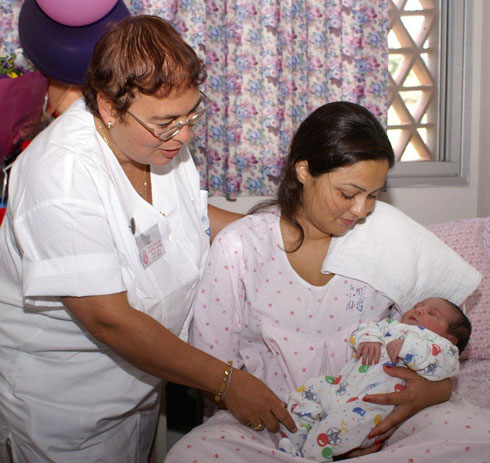|

"Early discharge can be considered."
Dr. Osnat Wolpish |
Over the past few decades, the time to discharge for new mothers grew shorter and involves both medical and financial considerations. Today, at most hospitals in Israel, new mothers are discharged 36 to 48 hours after giving birth, provided the birth was normal and there were no complications. However, the length of hospitalization around the world ranges between a matter of hours to several days following childbirth. The stay in the Obstetrics and Gynecology Department in the hospital after giving birth generally includes an examination by a physician at least once a day, close nursing care and frequently education on breastfeeding and care for the newborn.
In 2012, a panel of professionals from the World Health Organization determined that mothers should be under the care of a skilled professional for the first 24 to 48 hours following an uncomplicated vaginal birth, and if the woman is discharged earlier, postnatal visits to a professional are to be encouraged shortly after discharge.
When considering the discharge of a mother just a few hours after birth, there are several concerns: late diagnosis and treatment of complications such as hemorrhage and infection in the mother and newborn; concern that the mother will give up nursing due to a lack of appropriate and supportive education, and of course, the concern of a decline in the mother's level of satisfaction, as she may feel isolated or helpless at home due to a lack of professional support and optimal conditions for rest and care of the newborn.
Mothers are a highly diverse population, with vastly different needs. Some women, particularly after having their first child, require more support and professional guidance on how to care for the newborn and their own healing following childbirth. Others, with families, need to rest before getting back to the many tasks waiting for them at home, and others want to get back home quickly, because they feel best in their natural and private environment and feel confident enough to care for their newborn and themselves at home. For some women, real rest is at home, while others cannot rest at home for various reasons. Early discharge from the hospital is characterized (as the first set of women see it) as moving from a "sick" environment to a healthy, family and natural environment. This approach provides the advantage of giving the family an opportunity to bond with the new baby and allows the father and other family members to be more involved in caring for the baby.
Even a decade ago, Prof. Motti Hallak - Director of the Obstetrics, Gynecology and Reproductive Science Department at Hillel Yaffe, and I jointly with doctors from Soroka Hospital, published an article in an American medical journal about a study that assessed the timing and percentage of life-threatening complications that occur after normal childbirth in healthy women. In the study, we wanted to define the risk factors for development of complications and check when they occur. We focused on healthy women who had normal, uncomplicated vaginal births. Women with complicated births or background diseases or who had vacuum-assisted deliveries or Cesarean sections were not included. Women who developed heavy bleeding immediately after childbirth were not included, only those who were transferred for normal monitoring in the maternity ward following childbirth. Just like the princess.

Don't scoff at the need for support and education after birth
The most common complications found were (in descending order of frequency): heavy bleeding, fever, thrombophlebitis and anemia.
Heavy bleeding (over and beyond what is normal following childbirth) appeared on average about four hours following childbirth. However, fever, and the two other common complications (thrombophlebitis and anemia) appeared on average about 30 hours after childbirth. Bleeding was the most dangerous complication that appeared, and it is also the main complication that requires urgent medical care, while the rest of the complications observed, such as fever, do not require immediate medical care and certainly allow time to get to the hospital.
In the study, we also attempted to characterize the few women who developed complications after a normal birth. We found that the risk factors for complications in women following normal and uncomplicated childbirth are first birth, fifth birth or higher and Cesarean section in a previous birth.
The risk of mothers without those characteristics developing complications, even if she is a princess, is very low. Therefore, our conclusion was that early discharge may be considered, in other words six hours after birth for women who had normal and uncomplicated deliveries and who do not belong to the risk group, provided they are interested in it.
Clearly, these women need to understand the meaning of early discharge and the complications that could arise, including learning how to identify a complication if it develops at home, and to have the ability to come in to receive medical treatment in a reasonable amount of time.
It is important to note that everything stated above relates to considerations relating to the new mother herself. Regarding the newborn - that's already a story from a different fairy tale, with other medical considerations.
It is also important to state that women who want to go home earlier than the standard discharge date can do so, provided they meet the standard medical criteria and promise to be highly aware of the development of complications.












.jpg?BannerID=39)

